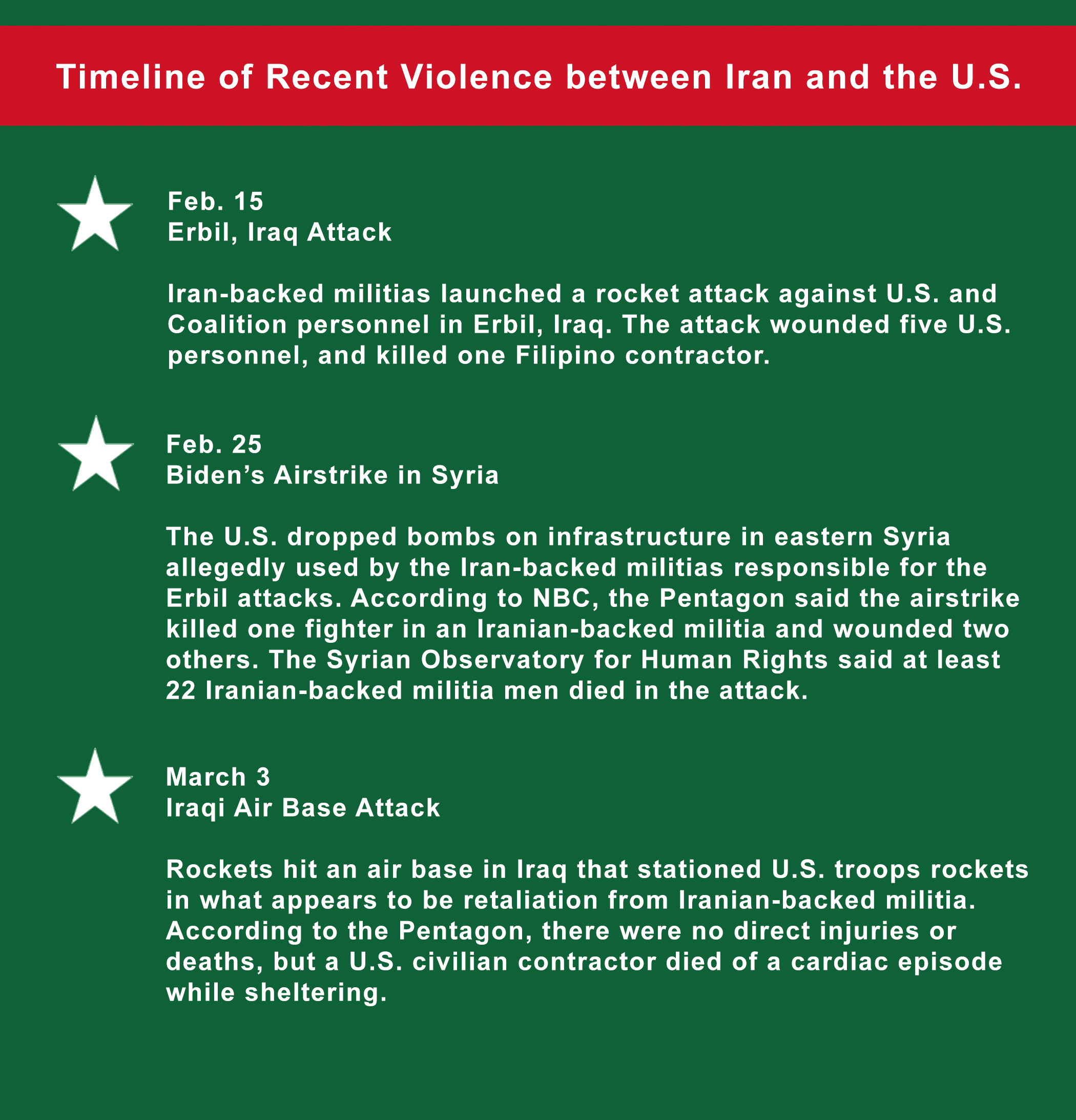President Joe Biden authorized airstrikes in eastern Syria on Feb. 25, targeting buildings used by Iran-backed militias. Per the Pentagon, these militias were responsible for the recent attacks on U.S. forces in Iraq. This was the first known U.S. military action under the Biden administration.
Six days later, in what appeared to be retaliation, rockets hit an air base in Iraq that stationed U.S. troops. The Pentagon has yet to identify who was responsible.
In a Feb. 27 letter to Congress, Biden defended the airstrikes as “pursuant to the United States’ inherent right of self-defense as reflected in Article 51 of the United Nations Charter.” Biden confirmed that the airstrikes were a direct response to recent attacks against U.S. and Coalition personnel in Iraq, including the Feb. 15 attack at Erbil International Airport. Coalition personnel include multinational forces that are led by the U.S. military.

These actions are what Northwestern political science professor Will Reno described as “tit-for-tat low-level conflict” between Iran and the U.S. that’s been happening for years. Each side wants to keep the stakes fairly low, because neither country wants an all-out war, said Reno, an expert on armed conflicts in the Middle East and Africa.
“It’s played out through proxies in the region. On the Iranian side, the proxies are militias. Some of them are backed by political parties in Iraq and Syria,” Reno said. “The U.S. proxies have been, among others, the government of Iraq.”
That’s why in both cases of Iran-backed militia attacks, the targets have been Iraqi locations with U.S. personnel. It’s also why the Biden administration decided to attack infrastructure utilized by Iran-backed militia in Syria.
Choosing a target in Syria was a deliberate move by the Biden administration to prevent escalation, according to Reno. An attack on Iranian soil would have unquestionably escalated the conflict, and a strike in Iraq would have hurt relations between the U.S. and Iraqi government. “Offstage” countries such as Syria were an ideal spot for Biden to respond to Iran, Reno said.
Biden vs. Trump (vs. Obama)
The Syria airstrike also showed the world how Biden would approach U.S. foreign policy in the Middle East. His actions have already differed from those of Trump and even from those of former president Barack Obama.
Obama was inconsistent with his actions and less willing to use force in the Middle East, Reno said. One example was Obama’s lack of response to Syria’s use of chemical weapons against its own people after he declared the “red line” to initiate military intervention would be chemical warfare. In comparison, Biden’s airstrikes indicate that the President is most likely taking a bolder approach and applying more pressure.
Though former president Donald Trump also adopted a tough approach he called applying “maximum pressure,” he often acted recklessly, and his policies were difficult to predict, Reno said. The most notable example was the U.S. assassination of Iranian General Qasem Soleimani in Iraq last January, which sent shockwaves throughout the Middle East and rest of the world.
“[There’s] an element of continuity from Trump, but much more disciplined,” Reno explained.
What to expect
The Pentagon and Biden both believe the airstrike sent an unambiguous message that Biden will act to protect American and Coalition personnel against these attacks and future ones.
“The United States always stands ready to take necessary and proportionate action in self-defense, including when, as is the case here, the government of the state where the threat is located is unwilling or unable to prevent the use of its territory by non-state militia groups responsible for such attacks,” Biden wrote in his Feb. 27 letter to Congress.
Each of these attacks is a signal, a way of communicating by action and responding to their adversaries, Reno said. Unless there is substantial political change, Reno said he expects these tit-for-tat actions to continue. But Reno also warns of the looming threat these low-level conflicts present.
“When you have these kinds of games, everybody’s better off if at least the adversaries exercise discipline, because if they don’t, it increases the probability of miscalculation,” Reno said. “That’s where you get the overreaction, and then the other side loses face, loses credibility, then they don’t respond proportionately. And the danger is you could get a spiral. And at that point you get more pressure for both sides to go to war with each other.”
Article thumbnail “Flag of Syria” by users TRAJAN 117 and Marc Mongenet is licensed under CC BY-SA 3.0.